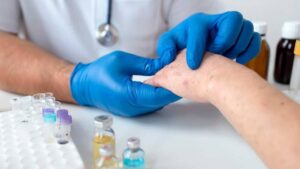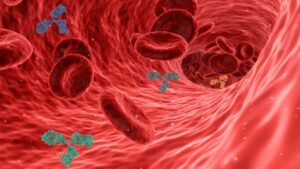What is Postherpetic Neuralgia (PHN)?
Postherpetic neuralgia (PHN) is a painful condition that occurs as a complication of infection by the varicella-zoster virus, the same virus responsible for chickenpox. After recovering from chickenpox, the virus remains dormant in the nerve ganglia. In some situations, the virus can reactivate, migrating along the nerve fibers and causing inflammation and nerve damage.
It is believed that this reactivation is related to decreased immunity due to aging, stress, illness, or immunosuppressive medications.
Postherpetic Neuralgia Transmission
Transmission of Postherpetic Neuralgia (PHN) occurs through the varicella-zoster virus, which can be transmitted through direct contact with chickenpox lesions or the blisters formed during the active phase of PHN.
However, it is important to note that Postherpetic Neuralgia is not a contagious condition, meaning that a person with Postherpetic Neuralgia (PHN) cannot directly transmit it to another person. The disease only occurs in individuals who have previously been infected with the varicella-zoster virus.
Postherpetic Neuralgia Prognosis
The prognosis of Postherpetic Neuralgia (PHN) varies from person to person. Some patients experience a gradual improvement in symptoms over months or years, while others may suffer from persistent pain for a longer period of time.
The primary risk factor for the development of PHN is advanced age. It is estimated that the incidence of Postherpetic Neuralgia increases with the aging of the population due to decreased immunity and the increased prevalence of varicella-zoster virus infections.
Postherpetic Neuralgia Symptoms
The symptoms of Postherpetic Neuralgia are characterized by intense chronic pain in the affected area, which can be described as a burning, tingling, or electric shock sensation. This pain can be constant or episodic and may be accompanied by sensitivity to touch and itching of the skin.
The pain of Postherpetic Neuralgia typically occurs in a limited area of the body, corresponding to the path of the nerve affected by the varicella-zoster virus.
Postherpetic Neuralgia Treatments
The treatment of Postherpetic Neuralgia (PHN) aims to alleviate pain and improve the patient’s quality of life. The most commonly prescribed medications for the treatment of Postherpetic Neuralgia PHN include tricyclic antidepressants, anticonvulsants, and opioid analgesics.
These medications help reduce the intensity of pain and improve the function of the affected nerve. In addition, non-pharmacological treatments may be recommended, such as physiotherapy, acupuncture, and cognitive-behavioral therapy, which can assist in pain management and rehabilitation.
Physiotherapy plays an important role in the treatment of Postherpetic Neuralgia (PHN) as it can help improve muscle function, relieve stiffness and muscle tension, and promote mobility. Physiotherapists may use techniques such as stretching, strengthening exercises, therapeutic massage, and myofascial release techniques to reduce pain and improve the patient’s quality of life.
Acupuncture has also been widely used as a treatment option for Postherpetic Neuralgia (PHN). This ancient practice involves the insertion of needles into specific points of the body to stimulate the nervous system and promote pain relief. Studies have shown that acupuncture can be effective in alleviating the pain of Postherpetic Neuralgia (PHN), being a safe option with few side effects.
Cognitive-behavioral therapy (CBT) is another approach that can be beneficial in the treatment of PHN. This form of therapy helps the patient identify and modify negative thought patterns and dysfunctional behaviors related to pain. CBT can teach coping strategies, promote relaxation, and improve sleep quality, which can contribute to pain reduction and emotional adaptation to the condition.
Additionally, adopting self-care measures in the management of Postherpetic Neuralgia (PHN) is essential. This includes avoiding activities that may trigger or worsen pain, such as prolonged sun exposure, excessive stress, sudden movements, or intense physical activities. Maintaining a healthy lifestyle, with a balanced diet, regular low-impact exercise, and relaxation techniques, can also contribute to symptom control.
Foods to Avoid for Postherpetic Neuralgia
Adopting a healthy and balanced diet can contribute to overall well-being and help manage the symptoms of postherpetic neuralgia.
Here are some dietary recommendations that may be helpful:
- Consume anti-inflammatory foods: Opt for foods that have anti-inflammatory properties, as inflammation can contribute to increased pain. Include foods such as fresh fruits and vegetables, especially those rich in antioxidants like berries, dark leafy greens, broccoli, and carrots. Additionally, include healthy sources of fat such as avocado, nuts, seeds, and extra virgin olive oil.
- Prioritize foods rich in omega-3 fatty acids: Omega-3 fatty acids have anti-inflammatory properties and may help reduce pain. Include fatty fish such as salmon, sardines, and tuna, as well as chia seeds, flaxseeds, and walnuts, which are good sources of omega-3.
- Increase fiber intake: Dietary fiber aids in regulating the digestive system and can help reduce inflammation. Consume fiber-rich foods such as whole grains, legumes, fruits, and vegetables. They can also contribute to maintaining a healthy weight, which is important for pain management.
- Avoid processed foods and refined sugars: Processed foods high in trans fats, additives, and refined sugars can increase inflammation in the body. Avoid foods such as snacks, sodas, candies, cakes, and cookies. Instead, opt for fresh foods prepared at home.
- Stay hydrated: Adequate hydration is essential for proper body function. Drink water regularly throughout the day and avoid excessive consumption of sugary and caffeinated beverages.
- Consider nutritional supplements: Some supplements may have benefits in reducing inflammation and promoting nerve health. Consult a healthcare professional to determine if supplementation with vitamins, minerals, or omega-3 fatty acids is appropriate for your specific case. It is important to note that each individual is unique and may respond differently to certain foods.
Sumary
Postherpetic neuralgia (PHN) is a painful condition that occurs as a complication of varicella-zoster virus infection. It is caused by the reactivation of the virus, which damages the nerves and results in intense chronic pain in the affected area. The prognosis of PHN varies, but there is generally a gradual improvement in symptoms over time.
The treatment of PHN involves the use of pain relief medications, as well as non-pharmacological therapies such as physiotherapy, acupuncture, and cognitive-behavioral therapy. Personal care, including the adoption of self-care measures, also plays an important role in the management of postherpetic neuralgia (PHN) and the improvement of patients’ quality of life.




